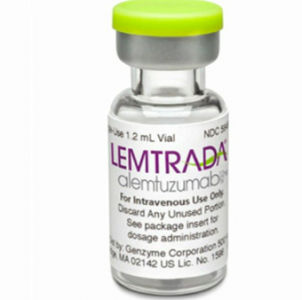European Medicine Agency (EMA) is recommending restriction of the use of the multiple sclerosis medicine Lemtrada (alemtuzumab) due to reports of rare but serious side effects, including deaths.
New measures to identify and manage the serious side effects are also recommended.
The side effects include cardiovascular disorders (affecting the heart, circulation and bleeding as well as stroke) and immune-related disorders (caused by the body’s defence system not working properly).
Lemtrada should now only be used to treat relapsing-remitting multiple sclerosis if the disease is highly active despite treatment with at least one disease-modifying therapy or if the disease is worsening rapidly.
Lemtrada must also no longer be used in patients with certain heart, circulation or bleeding disorders or in patients who have autoimmune disorders other than multiple sclerosis.
Lemtrada is contraindicated in:
- severe active infections until complete resolution
- uncontrolled hypertension
- history of angina pectoris, myocardial infarction, stroke or dissection of the cervicocephalic arteries
- coagulopathy, on antiplatelet or on anti-coagulant therapy
- concomitant autoimmune diseases other than multiple sclerosis
The medicine should only be given in a hospital with ready access to intensive care facilities and specialists who can manage serious adverse reactions.
EMA has also recommended updating the physician’s guide and the patient information pack with advice on minimising the risk of serious cardiovascular disorders, which may occur shortly after a Lemtrada infusion (drip), and immune-related conditions, which may occur many months and possibly years after the last treatment.
If any one experience below symptoms after receiving Lemtrada then they must get medical help immediately:
- Any chest pain or breathing difficulty while Lemtrada is being given (signs of heart problem)
- Cough up blood or have breathing difficulty (signs of bleeding in the lungs);
- Have drooping of the face, severe headache, neck pain, weakness on one side or difficulty speaking (signs of stroke or damage to blood vessels in brain);
- Skin or eyes turn yellow, or have dark urine, pain in belly or bleed or bruise easily (signs of liver damage);
- Have fever, swollen glands, bruising or rash (signs of a dangerous immune disorder called haemophagocytic lymphohistiocytosis).

Leave a Reply